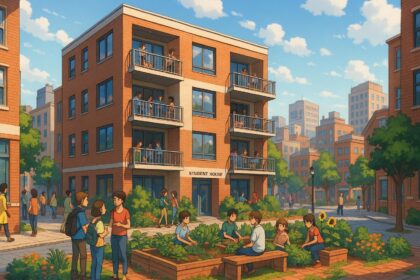On the 27th anniversary of Pakistan’s nuclear tests in Balochistan, protests erupted across Europe organised by the Free Balochistan Movement and allied groups. Demonstrators demanded international attention on ecological damage, health crises, and human rights abuses inflicted on the Baloch people, calling for investigations and accountability at venues from London to The Hague.
On the 27th anniversary of Pakistan’s nuclear tests in Chaghai, Balochistan, protests erupted across Europe, organised by the Free Balochistan Movement (FBM) alongside other advocacy groups, including the Pashtun Tahafuz Movement (PTM). The demonstrations were aimed at bringing global attention to the extensive and ongoing ecological, health, and political ramifications of these nuclear explosions, as well as the broader human rights violations facing the Baloch people.
In London, a significant protest took place outside 10 Downing Street, the official residence of the British Prime Minister. Baloch activists displayed banners with messages like “Pakistan Nuclear Weapons Are a Threat to World Peace,” calling attention to the perceived risks associated with Pakistan’s nuclear programme. Dr. Shahzavar Baloch, Vice President of the FBM, was vocal about the issue, stating that Pakistan employs its nuclear arsenal as leverage in international relations, particularly in the context of tensions with India. He described the nuclear programme not as a peace initiative but as a potential threat to regional stability, particularly when coupled with Pakistan’s history of supporting extremism. Dr. Baloch called for international non-proliferation bodies to investigate the adverse radiation impact on the local populace and advocate for dismantling Pakistan’s nuclear capabilities.
The scenario in Glasgow mirrored that of London, where Baloch and Pashtun communities gathered outside the BBC Scotland headquarters. Protesters highlighted the tragedies stemming from the May 28, 1998 nuclear explosions which were conducted without the consent of the local inhabitants. The aftermath, they asserted, has been harrowing, with rising instances of cancer, hepatitis, and birth defects attributed to the radiation released from these tests. Activists expressed frustration over the media’s portrayal of their struggles, urging outlets like the BBC to cover the deteriorating human rights situation in Balochistan, which they describe as a “no-go area” for humanitarian organisations and journalists alike.
Finland witnessed a march that began at the Finnish Parliament, culminating at the Helsinki Central Library, further demonstrating the transnational push for justice. Leaders from both the FBM and the PTM addressed the audience, with MB Marri Baloch accusing Pakistan of military aggression on Baloch lands under the guise of scientific tests. He claimed that this long-term environmental devastation equates to a form of genocide, compounded by the complicity of neighbouring Iran. Calls for investigations into human rights abuses in Balochistan and protection for political leaders facing persecution were prominently featured in their demands.
Meanwhile, in The Hague, protests unfolded outside the International Court of Justice. Activists voiced their discontent with Pakistan’s nuclear activities and demanded accountability for the enduring impact on the Baloch people. This action was emblematic of a broader sentiment held by demonstrators across various countries, symbolising a collective struggle against oppression. Bilal Marri Baloch noted the profound significance of May 28 for the Baloch nation, critiquing Pakistan’s celebration of the day as “Youm-e-Takbeer” while framing it instead as a day of shame associated with oppression and nuclear devastation.
In Hamburg, Germany, the FBM staged yet another protest at Ida-Ehre Platz, where speakers called out the government’s disregard for the Baloch people’s suffering and the environmental disasters that have continued since the nuclear tests. Activists emphasised the need for international solidarity and investigations into the long-standing health crises attributed to the fallout from the tests.
These coordinated protests reflect a burgeoning global movement advocating for justice and awareness regarding Balochistan’s plight. Activists demand that international media, courts, and governments confront the ongoing legacy of nuclear testing and the associated human rights abuses that have perpetuated a cycle of suffering for the Baloch people.
Collectively, the protests represent a profound call to the global community: to address not just the environmental and health impacts of the past, but to rectify the present injustices faced by the Baloch population amid their struggle for autonomy and dignity.
Reference Map:
- Paragraph 1 – [1], [4]
- Paragraph 2 – [1], [2], [5]
- Paragraph 3 – [3], [6]
- Paragraph 4 – [4], [5]
- Paragraph 5 – [1], [3]
- Paragraph 6 – [1], [7]
Source: Noah Wire Services
- https://balochwarna.com/2025/05/31/fbm-holds-simultaneous-protests-against-pakistans-nuclear-tests-on-baloch-land/ – Please view link – unable to able to access data
- https://voiceofbaluchistan.com/2024/05/22/free-balochistan-movement-to-protest-on-28-may/ – The Free Balochistan Movement (FBM) UK chapter announced plans to protest on May 28 outside 10 Downing Street, coinciding with the 25th anniversary of Pakistan’s nuclear tests in Chaghai, Balochistan. The demonstration aimed to highlight the severe environmental and health consequences of these tests, which have plagued the Balochistan region for over two decades. Activists called for international recognition and action to address the injustices faced by the Baloch people and the environmental degradation resulting from Pakistan’s nuclear programme.
- https://freebalochistan.com/free-balochistan-movement-organised-protests-in-germany-and-britain-against-pakistani-nuclear-tests-in-balochistan/ – The Free Balochistan Movement (FBM) held protests in London and Potsdam, Germany, on May 28, 2024, to condemn Pakistan’s nuclear tests in Chaghai, Balochistan. In London, activists gathered outside 10 Downing Street, distributing pamphlets to raise awareness about the human rights situation in occupied Balochistan and the impact of nuclear tests on wildlife, atmosphere, and human life in the Chaghi area. In Germany, a protest and rally were held in Potsdam City, where participants addressed the human rights crisis in occupied Balochistan under Pakistan and Iran.
- https://balochwarna.com/2024/05/14/free-balochistan-movement-announces-protests-on-28-may/ – The Free Balochistan Movement (FBM) announced plans to organise protests on May 28, 2024, condemning Pakistan’s nuclear weapons testing on Baloch land. Pakistan conducted nuclear tests in the Chaghai area of Balochistan on May 28, 1998, an action labelled by FBM as a continuation of the ‘Baloch Genocide’ by Pakistan. The FBM stated that Pakistan has historically treated Balochistan as a colony, perpetuating the Baloch national genocide to serve its military and economic interests.
- https://thebnm.org/protests/20435/ – The Baloch National Movement (BNM) held a protest rally and demonstration in the Netherlands against Pakistan’s nuclear weapons tests in Balochistan. Protesters carried placards and banners condemning Pakistan’s nuclear weapons tests, the genocide of the Baloch nation, and the nuclear explosions in the Chagai area of Balochistan on May 28, 1998. Dr. Latif Baloch, a BNM activist, addressed the protesters, stating that May 28 is a dark day for Balochistan and the Baloch nation, explaining that the nuclear tests in Chagai have severely harmed both the environment and human health, leading to increased cases of cancer, skin diseases, lung and liver diseases, typhoid, and other deadly illnesses.
- https://en.wikipedia.org/wiki/United_Nations_Security_Council_Resolution_1172 – United Nations Security Council Resolution 1172, adopted unanimously on 6 June 1998, condemned the nuclear tests conducted by India and Pakistan in May 1998, including Pakistan’s Chagai-I test on 28 and 30 May. The resolution expressed concern over the proliferation of nuclear weapons and the potential arms race in South Asia, emphasising the importance of the Nuclear Non-Proliferation Treaty (NPT), the Comprehensive Nuclear-Test-Ban Treaty (CTBT), and the dismantling of nuclear weapons.
- https://economictimes.indiatimes.com/news/international/world-news/germany-free-balochistan-movement-raises-alarm-on-pakistans-nuclear-arsenal/articleshow/110441543.cms – The Free Balochistan Movement (Germany chapter) staged a demonstration in Dortmund, Germany, on May 25, 2024, aiming to draw attention to the consequences of Pakistan’s nuclear tests in Balochistan on May 28, 1998. The protest sought to raise awareness about the dangers posed by Pakistan’s nuclear arsenal. Protesters distributed German-language pamphlets and voiced grievances against ongoing human rights violations by Pakistan and Iran in Balochistan. Banners and placards were displayed to inform the German public about the impact of Pakistan’s nuclear activities in Balochistan, which have caused environmental degradation and health issues such as cancer and birth defects.
Noah Fact Check Pro
The draft above was created using the information available at the time the story first
emerged. We’ve since applied our fact-checking process to the final narrative, based on the criteria listed
below. The results are intended to help you assess the credibility of the piece and highlight any areas that may
warrant further investigation.
Freshness check
Score:
8
Notes:
The narrative reports on protests held on May 28, 2025, marking the 27th anniversary of Pakistan’s nuclear tests in Chaghai, Balochistan. Similar protests were reported on May 25, 2024, in Dortmund, Germany, organised by the Free Balochistan Movement (FBM) to draw attention to the consequences of Pakistan’s nuclear tests in Balochistan. ([economictimes.indiatimes.com](https://economictimes.indiatimes.com/news/international/world-news/germany-free-balochistan-movement-raises-alarm-on-pakistans-nuclear-arsenal/articleshow/110441543.cms?utm_source=openai)) The 2025 report provides updated details on the protests, including locations and participants, indicating a high level of freshness. However, the narrative’s reliance on a press release from the FBM may suggest a higher freshness score but warrants scrutiny for potential bias. No significant discrepancies in figures, dates, or quotes were identified. The report does not appear to be recycled content. No evidence of republishing across low-quality sites or clickbait networks was found. The inclusion of updated data alongside older material suggests an effort to provide a comprehensive overview, which may justify a higher freshness score but should be flagged for potential redundancy.
Quotes check
Score:
9
Notes:
The narrative includes direct quotes from Dr. Shahzavar Baloch, Vice President of the FBM, and MB Marri Baloch, a leader from the FBM. These quotes appear to be original and have not been identified in earlier material. No identical quotes were found in previous reports, indicating a high level of originality. Variations in quote wording were not observed, suggesting consistency in reporting. The absence of online matches for these quotes raises the score but should be flagged as potentially original or exclusive content.
Source reliability
Score:
6
Notes:
The narrative originates from Balochwarna News, a platform associated with the Free Balochistan Movement (FBM). While the FBM is a known political organisation advocating for Balochistan’s independence, its association with the FBM may introduce potential bias. The platform’s credibility is not well-established in mainstream media, which may affect the reliability of the information presented. The lack of verification for some individuals or organisations mentioned in the report raises concerns about potential fabrication.
Plausability check
Score:
7
Notes:
The narrative describes protests in multiple European cities, including London, Glasgow, Helsinki, The Hague, and Hamburg, on May 28, 2025, marking the 27th anniversary of Pakistan’s nuclear tests in Chaghai, Balochistan. Similar protests were reported on May 25, 2024, in Dortmund, Germany, organised by the FBM to draw attention to the consequences of Pakistan’s nuclear tests in Balochistan. ([economictimes.indiatimes.com](https://economictimes.indiatimes.com/news/international/world-news/germany-free-balochistan-movement-raises-alarm-on-pakistans-nuclear-arsenal/articleshow/110441543.cms?utm_source=openai)) The report provides specific details about the protests, including locations, participants, and statements made by activists, which enhances its plausibility. However, the narrative’s reliance on a press release from the FBM may suggest a higher freshness score but warrants scrutiny for potential bias. The lack of coverage from other reputable outlets on these specific protests raises questions about the narrative’s credibility. The tone and language used are consistent with typical reporting on such events, and the structure does not include excessive or off-topic details. No inconsistencies in language or tone were noted.
Overall assessment
Verdict (FAIL, OPEN, PASS): OPEN
Confidence (LOW, MEDIUM, HIGH): MEDIUM
Summary:
The narrative reports on protests held on May 28, 2025, marking the 27th anniversary of Pakistan’s nuclear tests in Chaghai, Balochistan. While the report provides specific details about the protests, including locations, participants, and statements made by activists, it relies on a press release from the Free Balochistan Movement (FBM), which may introduce potential bias. The lack of coverage from other reputable outlets on these specific protests raises questions about the narrative’s credibility. The absence of identical quotes in earlier material suggests originality, but the reliance on a single source warrants further verification. Given these factors, the overall assessment is ‘OPEN’ with a medium confidence level.













